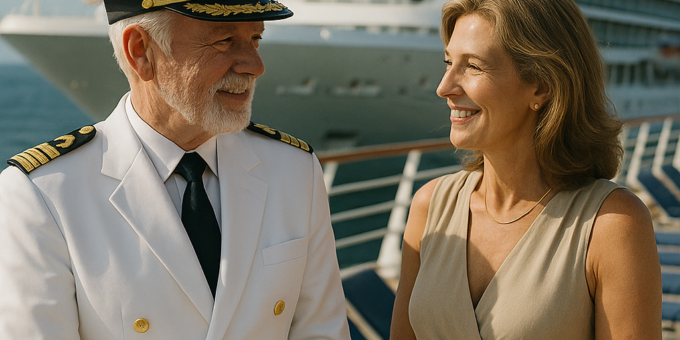
Planning a comfortable retirement as a luxury cruise captain isn’t just about finances—it’s about redefining your life after years at sea. The maritime profession is prestigious, adventurous, and well-paid, yet it often lacks the consistent infrastructure that land-based jobs provide when it comes to long-term financial security.
With a unique blend of high-income potential and demanding lifestyle, cruise captains need a tailored retirement plan. Starting early, investing wisely, and understanding the nuances of your industry will determine whether your retirement is luxurious or laborious.
Understanding the Cruise Captain Career Arc
Cruise captains typically start as deckhands or navigation officers before ascending the ranks. With 15–25 years of service, most reach their financial peak between ages 45 to 55. However, this also means they have a narrow window to accumulate savings, unlike land-based professionals who can work into their late 60s.
Despite the hefty paychecks, irregular contracts, tax complications, and high-stress routines mean retirement planning often takes a back seat. This makes strategic preparation even more vital.
Why Retirement Planning is Crucial for Captains
Here’s the catch—maritime contracts may not always come with pensions, and even if they do, they’re often insufficient for someone accustomed to a luxurious lifestyle. Captains also face the risk of early burnout, health decline, or maritime industry changes that can abruptly end their seafaring journey.
Planning ensures that you’re not just retiring from a job but transitioning into a lifestyle you’ve envisioned—whether that’s a vineyard in Tuscany or a beach house in Bali.
Start Early: The Golden Rule of Financial Planning
There’s a reason the phrase “time is money” exists. The sooner you begin saving and investing, the more you benefit from compounding interest. Even modest monthly contributions in your 30s can outgrow large investments made in your 50s.
Besides, early planning lets you experiment with various asset classes without risking your security. From crypto to commercial real estate, your 30s and 40s are ideal for trial and error.
Estimating Retirement Needs Based on Your Lifestyle
Are you envisioning yacht parties or quiet mountain retreats? It matters. A luxury retirement might cost upwards of $80,000 annually depending on location and lifestyle. To project future costs, consider:
-
Housing and travel preferences
-
Healthcare needs
-
Inflation
-
Legacy plans for children or charities
Using tools like the “RetirePlan” or “SmartAsset Calculator” can help put numbers behind your dreams.
Breaking Down the Luxury Lifestyle in Retirement
A cruise captain’s taste can be hard to tame. You’ve dined at Michelin-star restaurants, sailed into exotic ports, and lived in luxury suites. Translating this into retirement requires:
-
High-end health coverage
-
A buffer for luxury travel
-
A concierge financial advisor
-
Club memberships, yachts, or resort villas
It’s doable, but it requires aggressive savings and diversified income streams.
Pensions and Maritime Retirement Benefits
Most cruise lines contribute to a private pension or offer end-of-service benefits. But be cautious—these are often capped or subject to volatile exchange rates. Countries like Norway and the UK offer seafarers specific pension schemes that may be portable. Always check:
-
National eligibility
-
Taxation treaties
-
Withdrawal restrictions
Smart Saving Strategies During Active Years
Your earnings during peak years must do heavy lifting. Consider:
-
Setting aside at least 30% of your income
-
Opening an international retirement account
-
Automating investments in mutual funds
-
Diversifying income through side businesses
Live below your means—even when your paycheck says otherwise.
Investment Options for Maritime Professionals
Captains should explore:
-
Stock Market: Low-maintenance ETFs or index funds
-
Real Estate: Rental properties in stable markets
-
REITs: Real estate investment without landlord hassles
-
Maritime Funds: Invest in ship leasing or logistics companies
-
Commodities: Gold or oil futures as inflation hedges
Consult a maritime-specialized financial advisor.
The Importance of Passive Income
Post-retirement should feel like smooth sailing, not financial firefighting. Passive income allows that. Top options include:
-
Vacation rentals
-
Dividend-paying stocks
-
Publishing nautical memoirs
-
Online maritime courses
-
Affiliate marketing or YouTube channels
Make your knowledge work for you long after you’ve left the bridge.
You Can Also Read:How to Budget for Debt Repayment: A Step-by-Step Guide
What is the ideal age for a cruise captain to start retirement planning?
The best time to start is as early as your 30s. Given the potentially high earnings during peak years, starting early allows you to take advantage of compounding, diversify your investments, and build a robust retirement fund without last-minute pressure. Even if you’re in your 40s or 50s, it’s never too late to plan smartly.
Do luxury cruise captains receive a pension from cruise lines?
Some cruise lines offer end-of-service benefits or contribute to pension plans, but these are often limited and vary by contract or nationality. Captains should not rely solely on these. Creating independent savings and retirement accounts is strongly advised to maintain a luxurious lifestyle post-retirement.
What is a realistic annual budget for a luxury retirement lifestyle?
For a comfortable and upscale retirement, captains should budget at least $70,000–$120,000 annually, depending on location, healthcare needs, and lifestyle preferences. This budget covers travel, high-quality housing, insurance, dining, and hobbies.
